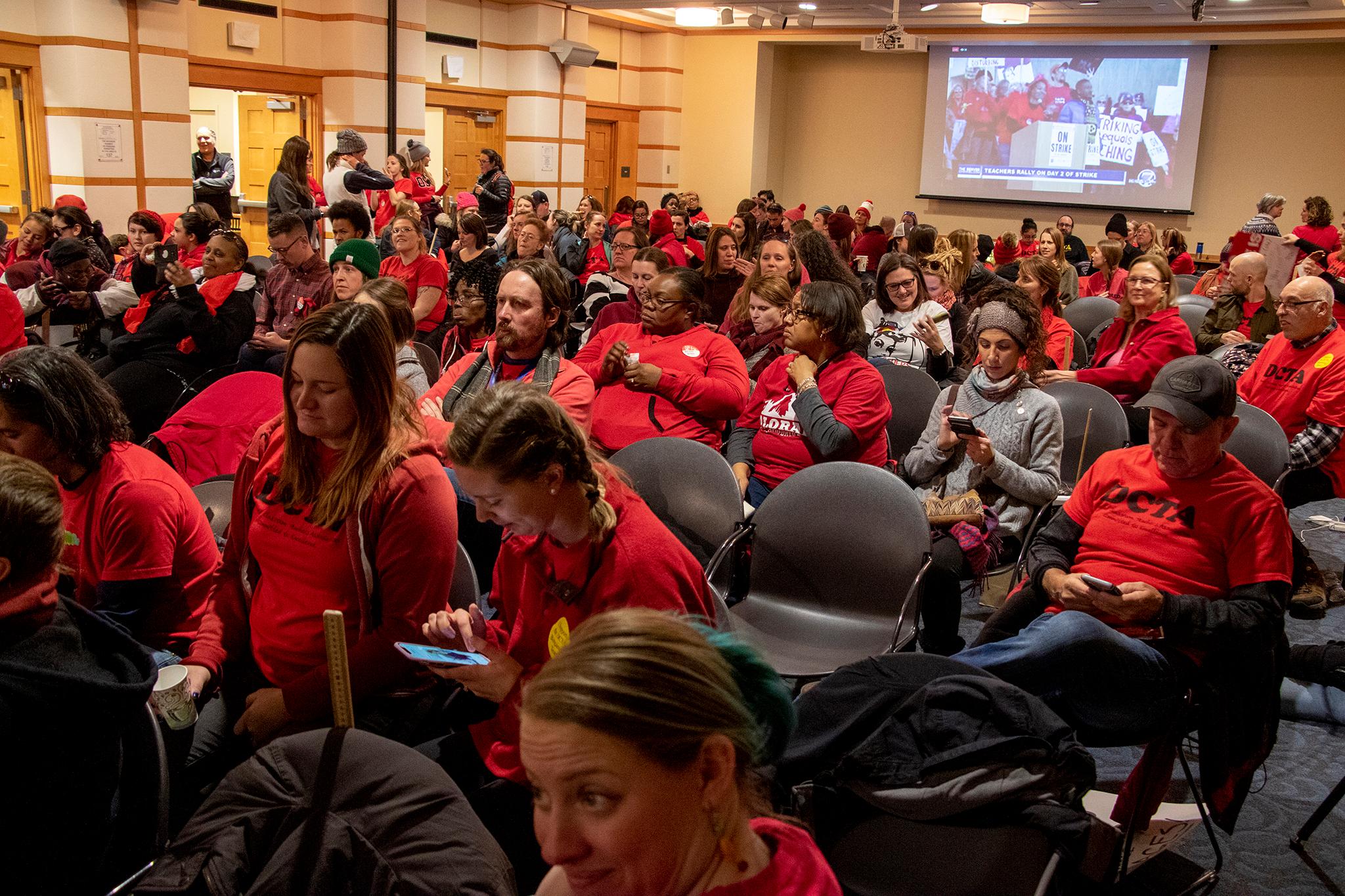The Denver school district and teachers union have reached an agreement in their long-simmering dispute over teacher pay, ending a strike as it entered its fourth day. The tentative deal gives teachers significant raises and a more traditional pay system, while keeping incentives for teachers at high-poverty schools that the district believes are essential.
The tentative agreement was announced shortly after 6 a.m. Thursday, after the two sides emerged from behind closed doors after some nine hours of huddling separately. They had begun the bargaining session at 10 a.m. Wednesday.
Union members and the Denver school board still need to approve the deal, but this brings a close to the first Denver teacher strike in 25 years. With the timing of the announcement, it's unclear if all teachers will return to work Thursday.
"We didn't want to have to go to the strike," lead union negotiator Rob Gould said after the tentative agreement was signed, "but the ability to utilize our last tool in our tool belt to get the district to listen to our needs -- we used it, and I think it's a victory for our teachers but more importantly, for our students."
The strike was a test for the union, which has become more assertive and gained members in recent years. Teachers on Wednesday expressed an eagerness to return to their classrooms after three days of picketing, rallies, and advocacy. Denver Superintendent Susana Cordova said she believes the strike was critical for teachers "to make incredibly clear what was important to them" and express their values.
"Frankly, they're values I share," Cordova said." Her hope for the future, she added, is that teachers and district officials could talk through differences "along the way, as opposed to it feeling like it's mounting and mounting and mounting."
With the exception of preschool classrooms, the district kept schools open throughout the strike using a combination of paraprofessionals, substitute teachers, and redeployed central office staff. But about a quarter of students stayed home, and some of those who did go to school reported problems ranging from overly simplistic lessons to chaos. At several large high schools, students walked out in support of their teachers.
The district and the union were negotiating major changes to a once-groundbreaking merit pay system that had become complicated and unpopular. Educators complained their pay was too low and unpredictable, and this deal goes a long way toward addressing those concerns.
The agreement will inject an additional $23.1 million into teacher pay and give educators an 11.7 percent raise next year on average, according to Denver Public Schools Chief Financial Officer Mark Ferrandino.
The deal covers 5,353 teachers, nurses, counselors, and other educators in the district. It will have ripple effects throughout the district, as part of the money to pay for the raises will come from cutting administrative costs, including 150 central office positions. Those same administrative cuts will also pay for raises to paraprofessionals, bus drivers, cafeteria workers, and others not covered by the teacher contract, the superintendent has said.
The agreed-upon salary schedule has seven "lanes" and 20 "steps." Lanes represent a teacher's educational attainment, such as whether they have a bachelor's or master's degree, and steps represents a teacher's years of positive evaluations.
Teachers would get a base salary raise whenever they move a lane or gain a step. That's different from how the district's pay system, called ProComp, works now. For years, the schedule has been used only to set teachers' salary when they are hired, with raises based on factors such as whether they complete certain training.
The starting base salary next year would be $45,800, a 7 percent increase from $42,789 this year. The maximum salary -- for educators with 20 years of experience and a doctorate -- would be $100,000. That doesn't include the bonuses and incentives teachers can earn on top of that.
The two sides agreed upon a $2,000 incentive for educators who work in high-poverty schools, a $2,000 incentive for educators who work in hard-to-fill positions, such as special education or secondary math, and a $3,000 retention bonus for educators who return year over year to 30 "highest-priority" schools.
That last bonus was a major sticking point in negotiations, which stretched over 15 months. The union originally proposed to eliminate it altogether and put the money into base pay for all teachers, but agreed Wednesday to compromise and keep it.
"We are open to the incentive because we know it's important to you," Gould said Wednesday evening. "And we're willing to entertain your ideas if we can get the base salary schedule that our teachers need."
However, union negotiators made clear they don't think the incentive is effective. The data doesn't support it, they said, arguing that there are better ways to improve conditions in high-poverty schools: smaller class sizes, less punitive discipline policies, hiring more teachers of color, and an evaluation system that doesn't penalize teachers for low student test scores.
"If we really care about these students in these schools, you'll be looking at these things and you'll be talking with educators," said Greg Ahrnsbrak, a physical education teacher at Bruce Randolph School and a member of the union bargaining team. "We're in the field. We know."
Nothing in this deal directly addresses those needs, though both sides hope that the new pay system improves teacher retention -- to the ultimate benefit of students.
The district also made several big concessions Wednesday, including reducing the number of proposed steps on the salary schedule from 30 to 20. Each step represents a year in which an educator gets a positive evaluation. Having fewer means educators can get bigger raises more quickly.
The two sides also agreed on an idea originally proposed by the district: allowing educators to get a raise for 10 years of continuous service with the district.
Arielle Sawyer, who teaches eighth grade language arts at Bear Valley International School in southwest Denver, said that she was thinking about how to catch her students up on missed work even as she marched along South Broadway Wednesday morning with hundreds of chanting, red-shirted colleagues.
"We are ready to get back in the classroom," she said. "We miss our students."
This is a developing story and will be updated.
Chalkbeat is a nonprofit news site covering educational change in public schools.













